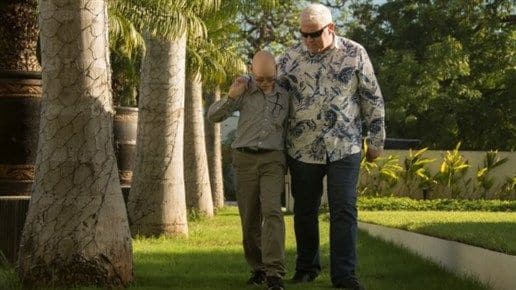Eye For Film >> Movies >> The Boy From Geita (2014) Film Review
The Boy From Geita
Reviewed by: Jennie Kermode

Here in the UK, around one in every 20,000 people has albinism, an absence of the melanin that gives colour to skin, hair and eyes. In Tanzania it's closer to one in 1,000. Perhaps this ought to make people more accepting of it - after all, this is thought to be the area where the genes that code for it originated - but in fact, the reverse is true. A high proportion of Tanzanians believe that albino people are cursed or that they are ghosts, not human at all. This has led to horrific persecution. The Boy From Geita, focusing on one child's story, aims to bring the problem to worldwide attention.
We talk a lot about the persecution dark skinned people suffer, as we should, says Peter, but what's overlooked is that there's also discrimination at the other end of the scale - there's an acceptable standard of paleness and people who are deemed too pale are targeted or abuse. It happened to him as a child, even in Canada, but he struggles to imagine how bad it is in Tanzania. There, men routinely abandon wives who bear them albino children. Such children are bullied out of school and struggle to find employment; if they work in the fields, they are at high risk of dying from skin cancer. But it gets worse. Because it is believed that potions made from the bones of albino people can confer wealth and power on those who consume them, albino body parts are highly sought after for muti. Enforce the law against this, witch doctors warn, and the people will be told not to vote for you at the next election. So whilst no politician is willing to act, albino children live in constant terror of attack.

This is one of the most harrowing documentaries released this year. It's not easy to listen to children recount how they were attacked with machetes, sometimes by several adults at a time; how they had their limbs hacked off; how they feared death. The apparent collusion of relatives and neighbours in some cases left them feeling they could trust no one. Adam, who used to love to draw ad dreamed of becoming a portrait artist, lost part of his hand in one such attack, and suffered serious damage to his other wrist. Peter, hearing his story, sought a way to help him - to fly him across the ocean for surgery, to give him back the dexterity that might enable him to complete his schooling and give him some kind of a shot at life despite it all.
Is this just another story of a privileged Westerner making himself feel like a hero by trying to save an African child? There's certainly a danger of that, but Vic Sarin's film shows us something rather more complex. If Peter wants to save anybody, it's probably himself; engaging with Adam seems to help him recover some of the confidence that schoolmates did their best to knock out of him. Adam, meanwhile, gets plenty of space to voice his doubts. He doesn't like being in a strange place; he feels betrayed, having expected a family member to be there. Even with an ocean between them, he still fears that his attacker will return to finish the job. And even though he is surrounded by pale skinned people, looking far less out of place, he clearly yearns to be back in his homeland with people like him; cultural affiliation is a much more potent thing than skin colour, even if Tanzania's albinophobes can't see that.
Though at times the film threatens to become overly sentimental, this sharp awareness on the part of Adam and other child participants always drags it back on track. Peter's efforts don't stop with Adam and we see him go on his own journey of understanding as he works to set up a support organisation for albino Tanzanians. We get a glimpse of a fledgling movement determined to make things better, with dedicated locals of varying skin types working to create a future for the next generation. Whether or not it will succeed is open to question; others have a strong financial interest in keeping things the way they are. But in a country which has shown amazing success in integrating people from different ethnic backgrounds, one has to hope that there can be some better prospects for albino people, too. Used by the UN to rally support, this film might help.
Reviewed on: 11 Oct 2015
















